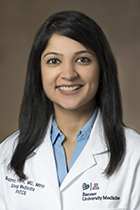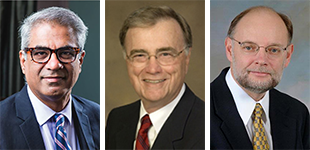 Salma Patel, MD, MPH, an assistant professor and sleep medicine specialist in the University of Arizona Division of Pulmonary, Allergy, Critical Care and Sleep Medicine, is among three winners of Career Development Awards from the AASM Foundation, which is affiliated with the American Academy of Sleep Medicine.
Salma Patel, MD, MPH, an assistant professor and sleep medicine specialist in the University of Arizona Division of Pulmonary, Allergy, Critical Care and Sleep Medicine, is among three winners of Career Development Awards from the AASM Foundation, which is affiliated with the American Academy of Sleep Medicine.
![Bare feet of sleeper in bed with heart rhythm painting above headboard [Max Pixel] Bare feet of sleeper in bed with heart rhythm painting above headboard [Max Pixel]](https://deptmedicine.arizona.edu/sites/default/files/sleeping-bed-feet-person-barefoot_600x325px-96dpi.jpg) The other winners, announced by the foundation on May 8(link is external), are from Washington University – St. Louis and Yale University. The projects will explore the relationship between obstructive sleep apnea and death, sleep and recovery in stroke survivors, and insomnia among the elderly population.
The other winners, announced by the foundation on May 8(link is external), are from Washington University – St. Louis and Yale University. The projects will explore the relationship between obstructive sleep apnea and death, sleep and recovery in stroke survivors, and insomnia among the elderly population.
 All three AASM Foundation award winners are funded in the amount of $100,000 each.
All three AASM Foundation award winners are funded in the amount of $100,000 each.
Dr. Patel’s project focuses on “Cardiorespiratory Interactions during Noninvasive Ventilation.” It addresses the role of ventricular repolarization in obstructive sleep apnea (OSA)-related mortality — specifically examining the relationships between corrected QT interval (QTc) prolongation/variability with OSA and its treatment and mortality in the Sleep Heart Health Study(link is external) and Banner Health databases.
![Einhoven triangle [Courtesy McGill Physiology Virtual Lab, McGill University] Einhoven triangle [Courtesy McGill Physiology Virtual Lab, McGill University]](https://deptmedicine.arizona.edu/sites/default/files/einthoven_expl_250x250px-96dpi.jpg) QT refers to an interval seen in an electrocardiogram (ECG/EKG) test of heart function. Atrial and ventricular depolarization and repolarization are represented on the EKG as a series of waves: the P wave followed by the QRS complex (the main spike seen on an EKG line) and the T wave. Ventricular depolarization occurs right before the atria contract and push blood into the ventricles. Repolarization is the restoring of the heart to its resting state.
QT refers to an interval seen in an electrocardiogram (ECG/EKG) test of heart function. Atrial and ventricular depolarization and repolarization are represented on the EKG as a series of waves: the P wave followed by the QRS complex (the main spike seen on an EKG line) and the T wave. Ventricular depolarization occurs right before the atria contract and push blood into the ventricles. Repolarization is the restoring of the heart to its resting state.
![Somnography results [Courtesy of Journal of Clinical Sleep Medicine, Vol. 15, No. 5, pp. 597-619, 2012] Somnography results [Courtesy of Journal of Clinical Sleep Medicine, Vol. 15, No. 5, pp. 597-619, 2012]](https://deptmedicine.arizona.edu/sites/default/files/jcsm.8.5.597c_fig3_325x253px-96dpi.jpg) It is unknown whether OSA-related changes on markers of ventricular repolarization are responsible for mediating the relationship between OSA and death. A retrospective analysis of existing sleep study databases will be performed to review baseline markers of ventricular repolarization in patients with OSA and evaluate the impact of apneas/hypopneas and all modes of noninvasive ventilation on markers of ventricular repolarization and mortality.
It is unknown whether OSA-related changes on markers of ventricular repolarization are responsible for mediating the relationship between OSA and death. A retrospective analysis of existing sleep study databases will be performed to review baseline markers of ventricular repolarization in patients with OSA and evaluate the impact of apneas/hypopneas and all modes of noninvasive ventilation on markers of ventricular repolarization and mortality.
In her project statement, Dr. Patel notes, “The question of how alternative ventilatory strategies (other than continuous positive airway pressure, or CPAP, devices) influence cardiac arrhythmia/mortality is highly relevant in light of data from ![Sleep apnea and implications for heart health [Courtesy https://stopsleepapnea.today] Sleep apnea and implications for heart health [Courtesy https://stopsleepapnea.today]](https://deptmedicine.arizona.edu/sites/default/files/cardiologists-study-nugent_450x262px-96dpi.jpg) the SAVE(link is external) and SERVE-HF(link is external) studies. There is uncertainty over how to use/optimize devices in individuals with sleep-disordered breathing and cardiac disease. These study aims, if successful, would be highly impactful and also set the investigator to propose clinical trials to prospectively evaluate alternative devices.”
the SAVE(link is external) and SERVE-HF(link is external) studies. There is uncertainty over how to use/optimize devices in individuals with sleep-disordered breathing and cardiac disease. These study aims, if successful, would be highly impactful and also set the investigator to propose clinical trials to prospectively evaluate alternative devices.”
Dr. Patel joined the faculty at the UA College of Medicine – Tucson last fall. She earned her medical degree from the UA College of Medicine – Phoenix, along with a master’s in public health from the UA Mel and Enid Zuckerman College of Public Health, in 2013. Afterward, she did her residency training in internal medicine at the Mayo Clinic, Scottsdale, and her fellowship in sleep medicine (adult and pediatric) at the Mayo Clinic in Rochester, Minn. She came to the United States from Tanzania in 2002 to attend Luther College in Decorah, Iowa. Learn more about her background in this article from the Mayo Alumni Association(link is external).
Dr. Patel’s particular AASM Foundation funding is for the American Board of Sleep Medicine (ABSM) Junior Faculty Award, which is for physicians (MD or DO) with faculty appointments who have completed an Accreditation Council for Graduate Medical Education (ACGME) approved sleep medicine fellowship within the last 10 years. This award provides an opportunity to support a two-year mentored sleep and circadian research project for early-career faculty who are physician scientists in sleep medicine.
Her primary mentor is Sairam Parthasarathy, MD, professor of medicine, chief of the UA Division of Pulmonary, Allergy, Critical Care and Sleep Medicine, director of the UA Health Sciences Center for Sleep and Circadian Sciences and Banner – University Medicine Center for Sleep Disorders, and a consultant to the National Institutes of Health on development of its five-year strategic plan for sleep medicine research. Other mentors include: 
- Raymond L. Woosley, MD, PhD, professor of medicine and biomedical informatics at the UA College of Medicine – Phoenix, president and board chairman for AZCERT (a not-for-profit organization dedicated to improved outcomes on use of medications), and founder and former president of the Critical Path Institute, or C-Path (an independent, non-profit organization created by the U.S. Food and Drug Administration and the UA). He also served previously as vice president for health sciences and dean of the UA College of Medicine – Tucson; and
- Wojciech Zareba, MD, PhD, a professor of medicine, director of Cardiology Clinical Research and the Heart Research Follow Up Program at University of Rochester Medical Center, Rochester, N.Y., and principal investigator or co-PI on several NIH and corporate grants focused on risk stratification of cardiac death and on clinical usefulness and prognostic significance of ECG parameters.
Dr. Patel also will work with Bonnie LaFleur, PhD, a statistician and research professor of biostatistics at the UA BIO5 Institute and UAHS Center for Biomedical Informatics and Biostatistics.
Healthier Lives through Better Sleep
The mission of the AASM Foundation is to promote discoveries that advance the understanding of sleep for healthier lives. Contributions directly support the AASM Foundation’s programs, including the Career Development Awards, that are expanding the pipeline of sleep clinician scientists by providing funding and mentorship to new investigators.
Learn more at: foundation.aasm.org(link is external)

